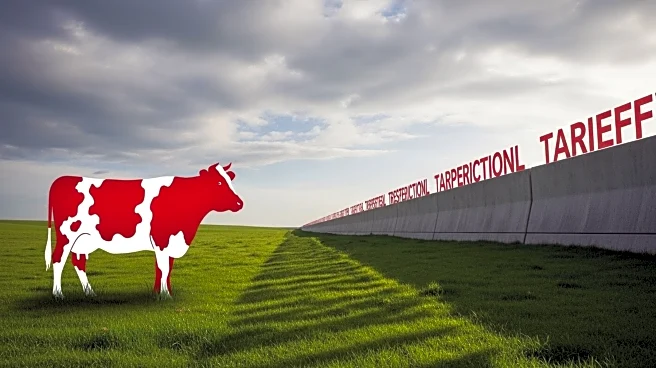What's Happening?
Brazil's beef exports to the United States are projected to decrease significantly in September due to increased tariffs imposed by President Trump. According to Roberto Perosa, head of the Brazilian beef lobby Abiec, exports are expected to drop to approximately 7,000 metric tons, down from 9,000 tons in August and 30,000 tons per month prior to the tariffs. These tariffs, which came into effect in August, have reshaped global beef trade flows, with Mexico overtaking the U.S. as the second-largest destination for Brazilian beef. The U.S. tariffs include a 50% levy on several Brazilian goods, adding to a 26.4% import tax for beef shipped outside a pre-established quota.
Why It's Important?
The imposition of tariffs by the U.S. has significant implications for global trade dynamics, particularly affecting the beef industry. Brazil, as the world's largest beef exporter, relied heavily on the U.S. market, which was its second-largest buyer. The shift in trade flows, with Mexico now taking the second spot, highlights the impact of trade policies on international market relationships. The tariffs could lead to increased costs for U.S. consumers and affect the competitiveness of Brazilian beef in the U.S. market. Additionally, these changes may influence Brazil's trade strategies and its economic relations with other countries.
What's Next?
The ongoing trade tensions and tariff policies may prompt Brazil to seek alternative markets to compensate for the reduced exports to the U.S. The Brazilian beef industry might explore new trade agreements or strengthen existing ones with other countries to mitigate the impact of U.S. tariffs. Meanwhile, U.S. stakeholders, including consumers and businesses, may experience changes in beef prices and availability, potentially leading to calls for policy adjustments or negotiations to address the trade barriers.
Beyond the Headlines
The tariffs imposed by the U.S. not only affect trade volumes but also have broader implications for international relations and economic strategies. The competitive edge gained by Brazilian beef despite high tariffs suggests resilience and adaptability in global trade practices. This situation underscores the complex interplay between trade policies and market dynamics, which can lead to shifts in global economic power and influence.










